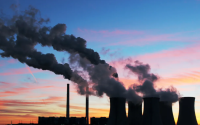5 July 2005The Independent
The leaders of the world's biggest developing countries, led by China's President, Hu Jintao, will be at Gleneagles this week to begin a vital dialogue with the rich nations about how to join in the fight against global warming.
Anyone concerned about this impending catastrophe should watch out for China and India. Then watch out for Brazil, and Indonesia into the bargain, and keep an eye on Mexico and South Africa, too. Because it is the greenhouse gas emissions from the developing nations, with their mushrooming economies, which will be crucial to the fight against climate change.
Yet at the moment the countries of what used to be called the Third World are not committed in any way to controlling the carbon dioxide pouring from their power stations and vehicles in ever-increasing amounts. They have no binding emissions reduction targets under the Kyoto protocol, the international climate treaty, of the sort that are applied to the industrialised countries, which was the principal reason why the United States Senate indicated it would never ratify the treaty.
Their overriding aim is growth. They recognise climate change is a threat to everyone, themselves included, but at the moment tend to treat any mention of binding CO2 targets with hostile suspicion, alleging that this is simply a way of forcing them to hold back their development.
Understandable, perhaps. But this situation is fraught with menace for the world. For if these countries cannot control their CO2 output, the efforts of the industrialised nations will be useless, as the benefits of any reduction that the rich world makes in the years to come will be swamped by the colossal emissions of the emerging economies.
It is widely knownthat the US, with 4 per cent of the world's population, emits 25 per cent of the world's CO2, and is thus the biggest polluter and climate disrupter on the planet. But within the next two decades China is likely to overtake the US as the biggest emitter, and thus become the biggest single influence on the stability of the atmosphere.
There is a good case for saying that the explosive, double-digit growth of the Chinese economy is the scariest thing on earth; the world has never seen anything quite like it. As the world's most populous nation it is home to 1.3 billion people, more than four times as many as the US rushes headlong towards capitalist wealth, it is sucking in commodities and natural resources on a scale already scarcely believable, but rapidly increasing.
In the five basic commodities of grain, meat, steel, coal and oil, China's consumption now outstrips that of the US in all but the last. In 2005 it uses twice as much steel as America, and consumes nearly twice as much meat half the world's pigs are in Chinese pigsties and 50 per cent more grain. The US may burn 600 million tons of coal a year, but China burns more than 800 million tons and the figure is set to soar. Only in oil does the US still lead, consuming three times as much as China (20 million barrels per day, compared with 6 million).
How is China to power this behemoth? Scary time again. Because the answer is, mainly by coal-fired power stations, the biggest CO2 producers of all. The Chinese intend to build 500 coal-burning electricity generating plants by 2030 of 1,000MW capacity each.
What this will do to world CO2 emissions, when combined with similar expansion in the other developing countries, led by India (where coal accounts for more than half of all its energy consumption 50.9 per cent in 2001; oil consumption is at 2.1 million barrels a day; but where vehicles are far fewer than in the US or China), was spelt out in graphic detail last year in the International Energy Agency's World Energy Outlook 2004.
By 2030, in the absence of action to cut back, emissions will have grown by 62 per cent, more than half of this from the developing world. Tony Blair's own aim to cut emissions from present levels by 60 per cent by 2050, in the hope of stabilising the climate, in such circumstances becomes a nonsense.
Anyone who gives the issue a minute's thought can see the active involvement of the developing countries is now an indispensable part of confronting global warming, and yet they are not involved. That is why Mr Blair's attempt at Gleneagles to start a climate change partnership with the developing world, or at least initiate a dialogue, is vital.
Mr Blair thinks he sees a way forward. It is to reassure emerging economies the rich West does not wish to hamper their growth but can assist them in growing cleanly. This could be done by helping them to design power stations with the technology to reduce CO2. But power stations, once built, last for up to 50 years, so this agreement is not only essential; it is essential soon.






